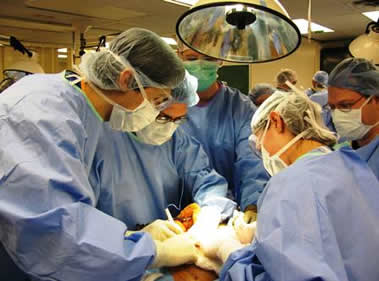
General Surgery Residency - Nov 1st Application deadline
Augusta University - Medical College of GeorgiaGeneral Surgery Residency
We strive to train motivated, confident, technically skilled, and compassionate general surgeons. The ultimate goal is that our surgeons, will be leaders in the future of their chosen field regardless of their practice environment. Our program has a legacy amongst its alumni of academic achievement, operative, & clinical excellence.
Our faculty bring a depth of clinical experience in every sub-specialty. Rural surgery rotations provide the ‘bread and butter’ of general surgery cases to each resident and a diversity of clinical settings.
We are dedicated to serving the needs of our community and the healthcare of Georgia. Residents will have unique career goals and interests. The objective is to provide the mentorship, networking, and research opportunities to facilitate their development.
Our trainees encounter a diverse patient population within inpatient and outpatient sites around Augusta, Georgia.
Our office advocates for residents and fellows by monitoring and providing support for activities within the GME programs under the guidelines and policies of the Accreditation Council for Graduate Medical Education (ACGME), the Medical College of Georgia at Augusta University, and Wellstar MCG Health. We believe in a clinical care model that is patient and family centered & strongly focused on education.
Virtual Education and Simulation Laboratory

The Virtual Education and Simulation Laboratory (V.E.S.L.) was created to be a local and regional resource for the skills training to a variety of audiences, including medical students, residents, physicians in practice and other allied healthcare personnel.
The V.E.S.L. is used for curriculum-based skills acquisition and provides continuing medical education (CME) activities for the Medical College of Georgia at Augusta University medical community and healthcare personnel of the Central Savannah River Area (CSRA). In addition to serving as an educational and training resource for the institution and regional community, the V.E.S.L. is also an educational research venue to explore and validate current and evolving tools used for curriculum-based skills training.
After four years of medical school, surgical education in the United States has followed a preceptorship model introduced by Dr. Halsted, whereby the trainee learns by “following” the teacher. Surgical residents are given graded responsibility over 5-7 years until they have learned surgical principles and mastered commonly performed operations. The traditional dogma for learning technical skills has been, “See one, do one, teach one.” This dogma is obsolete in the era of minimal access surgery, evolving technology, limited resident work hours, and faculty time constraints. In the history of surgical education, we have done little to determine whether these same skills are better taught outside the operating room. This has changed in recent years with the evolution of technology and development of viable skills transference assessment tools like the Objective Structured Assessment of Technical Skills (OSATS) and the McGill Inanimate System for Training and Evaluation of Laparoscopic Skills (MISTELS).
Basic technical skills and cognitive knowledge required to safely master emerging technology must be taught outside of the operating room beginning with students and residents. For example, teaching basic wound closure technique in the operating room (i.e. suturing) takes time, is expensive and does not lead to the efficient use of resources. Basic suturing and knot tying instead can be taught using basic instruments in a skills lab setting. Principles of wound healing can be integrated into learning objectives and after skills are mastered, students and residents can apply them in the operating room more efficiently. We are taking this concept and applying it to new and emerging technologies, which impacts surgical education and practice.
We recognize the impact that emerging technology has on the ability to efficiently teach technical skills in the operative arena. As such, we seek to teach such skills outside of the operating room, making trainees more efficient in the operating room, with the overall goals of better trained residents and greater efficiency in the OR.
Application Requirements
The General Surgery Residency Program at the Medial College of Georgia at Augusta University will offer six categorical positions for the 2026-2027 recruitment cycle. Applications are accepted only through the Electronic Residency Application Service (ERAS). Additional information regarding the program can be accessed via the American Medical Association's FREIDA online.
Recruitment for Year | 2026 - 2027
For the 2026-2027 interview season, applications will be accepted ONLY through ERAS and all interviews will be conducted in person. We will have an informal social gathering with only the residents the night before the interviews.
The deadline for receipt of applications is November 1, 2025. Once all applications have been received, the Selection Committee will select applicants to interview, to be placed on a waitlist or not to be interviewed. Our program uses the Thalamus scheduling system to send out invites, to schedule interviews and all other correspondence.
Contact Us
General Surgery Residency
706-721-2503